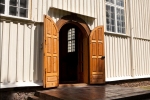October 18, 2023
When Teshuvah (Repentance) Starts at the Episcopal Church

For much of my life, Jewish High Holidays, a time of reflection and quest for redemption, have always included a visit to the local Episcopal church. I can explain.
Despite only living a few miles from my family’s synagogue (Shomrei Torah in Wayne, NJ), attending Rosh Hashanah and Yom Kippur services still proved to be a journey.
It started with the mad scramble to get my family of four all ready in time to depart for the synagogue in one car. In reality, coordinating “getting ready” rituals and requirements rarely made it possible to have fewer than two “departures”.
Then, came the short drive to the synagogue, followed by the ceremonial peek into the synagogue’s parking lot to see if there were any spaces available. To say that we never arrived right at the start of the service would be an understatement, and the synagogue parking lot was built for more “typical” event or service attendance – not holidays that see a 500-1000% growth in worshippers.
Once we admitted defeat, our collective voices (or inner voices, in the event that we were a car of one) would say “OK, let’s try the church.” I assure you we were not so easily swayed by parking troubles to abandon a religious tradition that has given meaning to our people and helped us endure for thousands of years. In fact, I didn’t even know what kind of church it was (you might wonder how that was possible – ask my dear colleague Rt. Rev. R. William “Bishop Bill” Franklin for that story).
“The church” (St. Michael’s Episcopal Church) was shorthand for the overflow parking lot made available to us for High Holidays. Always knowing that parking would be available at “the church” ensured Jewish families like mine who often struggled to get out the door that a late arrival wouldn’t mean parking miles away or circling the block for hours. Did it enable some worship tardiness? Sort of, but the truth was that we didn’t have to “try” the church; there was certainty that we’d find a spot there. We might have showed up to services late, but at least we weren’t completely frazzled.
We all must admit that allowing a neighbor to use your mostly unused parking lot for a few days is hardly noteworthy. But the truth is that there is a pretty significant tradition of Episcopal churches serving Jewish communities without their own appropriate physical places of worship (no space at all or not enough space to accommodate the “uptick” in attendance during High Holidays). High Holiday services were held this past year in Episcopal churches around the country, including:
Hermosa Beach, CA: Temple Shalom of the South Bay hosted by St. Cross Episcopal Church
Atlanta, GA: Congregation Bet Haverim hosted by St. Bartholomew's Episcopal Church
Lihue, HI: Jewish Community of Kauai hosted by Saint Michael & All Angels Episcopal Church
Jackson, WY: Jackson Hole Jewish Community hosted by St. John’s Episcopal Church
I could probably find more examples, but I am writing this post just as the sun sets marking the beginning of Yom Kippur (when work is supposed to cease). So let’s leave it at four, with the understanding that there surely are other examples.
But even more interesting and important is the role that Episcopal churches have played during some of the darkest days for Jewish communities in this country. When the Tree of Life Congregation in Pittsburgh, PA suffered a murderous antisemetic attack in 2018, Calvary Episcopal Church stepped up and worked with the Jewish community to create a welcoming home away from home, starting with High Holiday services in 2019. For several years, they continued in that role as Tree of Life went through their period of healing and thought through plans for “rebuilding” their physical home.
Congregation Beth Israel in Austin, TX, whose spiritual home was severely damaged by an antisemetic arsonist, found a similarly welcoming home for High Holiday services at St. Matthew’s Episcopal Church. In both cases, it was not merely about offering up the space; the church leaders worked with the Jewish communities to modify the physical space—including moving or covering religious furnishings and symbols—to make them feel as comfortable as possible. It is even mentioned that the progressive stances of the Episcopal Church, such as LGBTQ+ inclusivity, made the displaced Jewish communities feel more comfortable relocating to those Episcopal churches over other denominational church options made available.
The Episcopal and Jewish communities engage with one another throughout the year, working together on local interfaith coalitions and service organizations. And, of course, Jewish houses of worship have also forged positive working relationships—in local neighborhoods and beyond—with churches of other denominations. But, for me and many other Jews around the country, a visit to the parking lot or even the sanctuary of a local Episcopal church is part of the Jewish High Holidays experience.





